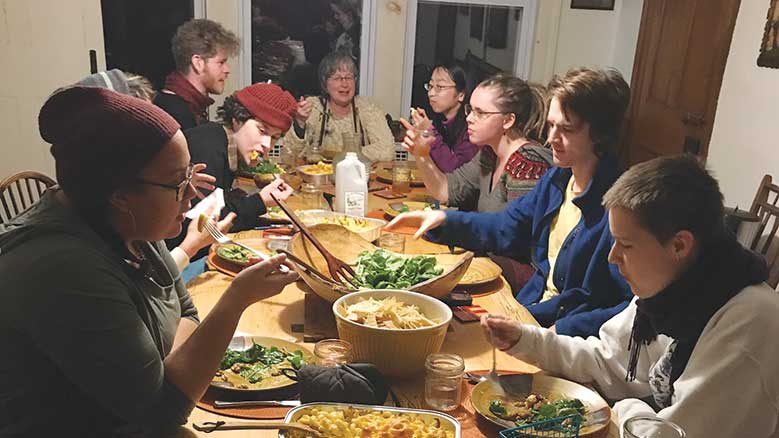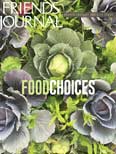
In the summer of 2013, I (Emily) stood across from the only other active member of my local Quaker meeting who was under the age of 40. It was not a profound encounter. I was walking into social hour; he was walking out. We passed in the hallway.
“How are you?” quickly turned into, “Don’t you wish we had more young people at Fifteenth Street?” It wasn’t like there weren’t young adults in the neighborhood. We’re just off Manhattan’s Union Square, blocks from New York University, and young adults visited the meeting all the time. But none of them stayed.
Anyway, quite casually, we decided to have an under-40 lunch. We’d invite anybody from the younger end of the spectrum to go out for something to eat after social hour. We set the date for two weeks away. We figured, if we did the publicity well, we might get five or six people.
We ended up with 17.
Eighteen months later, Fifteenth Street had gone from seven active or occasional young adult Friend (YAF) participants to twenty-two. Nine were on committees. Five were attending quarterly and yearly meeting events. And our clerk, assistant clerk, and recording clerk were all under 40.
An acquaintance from Africa once told me, “The most important thing you can do for a people is feed them.” That’s what we did at Fifteenth Street. The only goal of the lunches was lunch: feed people, talk with them, build relationships. It wasn’t about membership or committee service or even the meeting. It was about feeding people. To feed is to nourish.
The experience left me with some queries: do we feed one another in our faith communities? Do we feed ourselves well as we walk with God?
The Vital Meetings Project started mid-2016. Funded by the Shoemaker Foundation, it’s a partnership between New York and New England Yearly Meetings—which is how I found myself working with NiaDwynwen Thomas and some other great teammates. Our thesis was simple: “The Religious Society of Friends will thrive when vibrant local meetings invite, welcome, engage, serve, retain, and empower people throughout all the stages of their lives.”
But how do we do that, exactly? It reminds me of what Jesus of Nazareth said: “Love one another.” We quote that all the time, but sometimes we forget that when the early church got started and suddenly there was an institution to deal with, the Apostle Paul wrote a good 32,000 words explaining exactly what “love one another” means when you’re dealing with the same people in the same local faith community every single week for who-knows-how-many years.
What does it mean to love, to nourish, to feed ourselves as individuals?
What does it mean to do this as faith communities?

A real sit-down meal spent with others takes discipline and often the support of others. In order to spend more than a few minutes at a go feeding ourselves, we need to be willing and able to say “no” to other demands on our time.
When Emily first asked me (Nia) about the power of shared meals in Quaker spaces, it occurred to me that it’s not about the food itself: it’s what sharing a meal represents. A real meal demonstrates trust in abundance: abundant food, abundant time, abundant spiritual gifts, abundant faith.
For many young adults, home-cooked meals are few and far between. The intensity of work and school often means that food is reduced to a mechanical function. Keeping the machine running with utilitarian Clif Bars may be more common than sustaining body and soul with soup, daily bread, and rich conversation.
We live in a time when the economic divide between those who have plenty and those who are scraping by is increasing. Housing and education costs are skyrocketing while wages are stagnating. As a direct result, many see their young adulthood as a time when the joys of life are by necessity “on hold” until personal financial tasks are resolved and a career with earning potential is firmly landed. I frequently hear my peers describe our phase of life as one of constant rushing and reacting to the demands of “building a life” against increasingly grim economic trends. Young adults maintain this busy and pressured pace for years at a time, telling themselves that it’s a temporary state and that the future will bring a more balanced time that is rooted in spiritually replenishing routine. Many dream of a far-off future when the soul can be tended as actively as the budget and when Clif Bars eaten on the go are replaced with home-cooked meals at a shared table.
A real sit-down meal spent with others takes discipline and often the support of others. In order to spend more than a few minutes at a go feeding ourselves, we need to be willing and able to say “no” to other demands on our time. We need to be committed to restorative meals and time spent with others as priorities. Just as a Sabbath day of rest was a radical sign of faith to early farmers, setting aside time to really cook and linger over food together requires faith: what we have done with the other hours of the day is enough, and nourishing ourselves is as important as the to-do list.

Taking place in the home of local Friends who live right by campus and along the bus route (rather than in the meetinghouse), these dinners have a homey feel and signal that the shared table is the primary purpose.
I (Emily) find it striking that in Acts 2:42, just after Pentecost, we read that early believers “devoted themselves to the apostles’ teaching and the fellowship, to the breaking of bread and the prayers.” And again in Acts 2:46, “and day by day, attending the temple together and breaking bread in their homes, they received their food with glad and generous hearts.” To eat meals together has been a central act of spiritual communion since the earliest days of the Christian church.
When we take the spiritual discipline of setting aside time for nourishment into our meeting communities, we set the table for a feast that calls to others with a promise of plenty. When we feed people at meeting events, we have an opportunity to allow people to be reminded of God’s love. With a shared meal, we have the opportunity to signal to young adults that food for the soul does not need to be postponed into the mythical future and that joy and connection are available right now.
Against the backdrop of a culture that views time spent on non-economic functions as a risk, setting the table for a sit-down meal affirms our trust that we are already enough—and that God’s kin-dom is already in our midst. For young adults who are constantly under pressure to work harder to become “enough,” the way we feed each other may be a deeply needed glimpse of a generous God.
Five years ago, when John and Debbie Humphries began inviting the young adult attenders from Hartford (Conn.) Meeting into their home for a monthly meal, the power in the gathering was the generosity of time spent together, not just the free food. (The gatherings are technically potlucks with an emphasis on “or just bring yourself!” and an ever-ready big pot of soup from the hosts.) These dinners are about connecting people with each other, not burdening anybody with an agenda. As John Humphries reflects, “the essential recipe is a simple meal, followed by mugs of tea, infused with conversation and laughter.”
In western Massachusetts, I (Nia) have been amazed at the response to a dinner experiment of my own. In order to maintain a connection with college students who grew up Quaker but don’t regularly attend meeting, as well as to build upon outreach efforts to Quaker-curious students, I’ve offered a small series of dinners that are for “people who grew up Quaker, are Quaker, or are Quaker-curious, ages 18–25ish.” Taking place in the home of local Friends who live right by campus and along the bus route (rather than in the meetinghouse), these dinners have a homey feel and signal that the shared table is the primary purpose. Although the food is always appreciated, participants don’t come because they can’t get food elsewhere; they come because it reminds them they are loved.
Throughout the Vital Meetings Project, we’ve repeatedly seen that the aspects of our faith that are most compelling to young adults are an extension of our enduring trust in God’s bounty. When food and connection are at the center (“Just join us and eat!”) rather than to-do list items, the warmth shines through and saying “yes” is a joy.
For seekers whose spirits are depleted from the stress of life amidst a persistent scarcity mindset, we can signal abundance and our depth of faith in more ways than just with food. We show this trust in abundance when we approach nominating from a perspective of naming gifts rather than filling slots. We show it when we make an effort to connect meaningfully with individuals, even if they can’t “give back” because they plan to live halfway across the country next semester. We signal abundance when we create opportunities to form authentic relationships over shared play, service, and sharing and when we adopt pay-as-led and other inclusive pay structures. We signal it when we say “yes” to real, Spirit-led work even if it means saying “no” to seemingly urgent “shoulds.” For young adults (and many others), these signals are vital.
Young adults do not come to Quaker community seeking another activity that demands seemingly scarce resources like free time; they come to us seeking a place that jubilates in the richness we already have with one another. Rather than fixating on our limitations, vital meetings create opportunities to celebrate what we can experience together. In every aspect of our meeting life, we have the opportunity to demonstrate trust that our inmost hungers will be fed.



Very well said! Thank you Emily and Nia for sharing your wisdom and insights, and for encouraging others.
Dear Emily,
Thank you for your challenging piece about of abundance. I’m an artist with MS (Amesbury, MA, Monthly Meeting) and I can regularly settle into a scarcity mindset. Thanks for the reminder that my mind is the biggest stumbling block of all.
Ted
This is such a beautiful essay. Our young people are struggling so hard in a society that is not either welcoming or supportive. Most NYC graduates will be paying for their education into middle age. Feeding people is such a loving, non-judgmental act. We should all be aware that we must do the same, because on some level, we are ALL hungry.